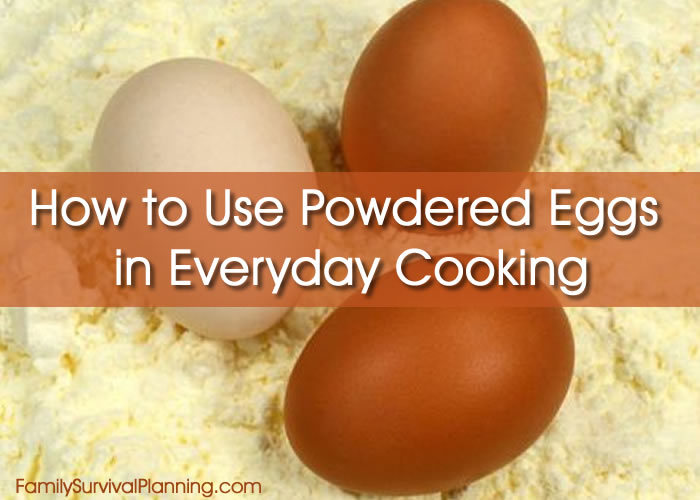
- HOME
- Food Storage Recipes
- Powdered Eggs
How to Use Powdered Eggs in Everyday Cooking

Have you ever tried using powdered or crystallized eggs in your recipes? Well, I have, and I was surprised that they actually taste good - like real eggs!
One of my favorite things about powdered eggs is that you always have eggs when you're ready to cook. No more borrowing from the neighbor or running to the store when you're halfway through a recipe only to find that you don't have enough eggs.
Dehydrated eggs can come in different forms, so let's see what the difference is.
Invest in emergency food storage now and enjoy peace of mind for the next 25 years. Don't miss out on the savings!
What are Powdered Eggs?
Whole egg powder is just that - whole eggs that have been dehydrated - some are freeze-dried. Their consistency and texture are similar to powdered milk.
You can buy whole eggs, just the yolks, just the whites, or already scrambled in powdered form.
They can be purchased in pouch sizes or #10 cans ( approximately 94 eggs) which makes them perfect for food storage.
Advantages of Powdered Eggs
There are several advantages of powdered eggs over fresh eggs.
- With proper storage conditions (cool, dark, dry), dried eggs should ideally be rotated every 3 years. Although some claim to have used powdered eggs that were 10 years old.
- It is not necessary to store the eggs in the refrigerator, but, as mentioned, store in a cool, dark area.
- Eggs that have been dried require much less storage space. This means substantial supplies of eggs can be kept on hand in a relatively small space.
- Re-hydrating the eggs for use in omelets and to make scrambled eggs require nothing other than the addition of a liquid, usually water or milk.
- In powdered form, the eggs can be added to baked recipes without the need to mix them with a liquid ahead of time.
How to Use Powdered Eggs
Whole eggs can be used in recipes where whole eggs are called for. Powdered egg whites can be whipped into meringue for lemon pies or angel food cakes.
Here's how to convert them to regular eggs:
- 1 Tablespoon egg powder + 2 Tablespoons water for a medium egg
- 2 Tablespoons egg powder + 1/4 Cup water for an extra large egg (Remember that there are 16 Tablespoons in 1 Cup to make multiple egg conversion easier)
- When baking you do not need to re-hydrate the eggs before adding to your mix, simply add the needed egg powder and needed water to your mix and proceed as your recipe outlines.
- If you need to half a recipe, you can half an egg with the powdered mix.
Recipes for Using Powdered Eggs
Never run out of eggs again! The cans come with an average equivalent of 72-96 eggs (depending on the brand).
Swedish Pancakes
An easy recipe for using your powdered eggs in breakfast foods.
3 T. powdered eggs
6 T. water
1 cup powdered milk
3 cups warm water
4 T. melted butter-flavored shortening or oil (or real butter)
2 T. sugar
1-1/2 tsp. salt
1-1/2 cups whole wheat flour
Put water and powdered egg mix in a bowl and whisk until well blended. Add dry milk, warm water, melted shortening/oil/butter, sugar and salt. Then add the flour, continuing to whisk until batter is smooth. Let sit for 5 minutes and mix again.
Melt 1 teaspoon shortening or oil in a hot pan. Pour 1/2 cup batter into the middle, tilting the pan or griddle to form about an 8-inch circle. Cook until batter sets and edges start to brown a little. Flip carefully and cook other side. Serve at once with syrup or other toppings.
Yields: 4 Servings
[T = Tablespoons]
[tsp = teaspoons]
[C = cup]
Here's another delicious recipe to use your powdered eggs:
French Toast with Orange Syrup
3 Eggs (3 T. dehydrated eggs + 1/3 C. Water)
1 C. Milk (3T. Milk + 1 C. Water)
2 T. Sugar
1/4 tsp. Salt
1/8 tsp. Ground Cinnamon
1/8 tsp. Ground Nutmeg
8 slices day-old French Bread, 1 inch thick (or whole wheat bread for more nutrition)
Orange Syrup
1/2 C. Orange Juice
1/3 . Corn Syrup
1/4 C. Sugar
4 tsp. Butter
1 tsp. Grated Orange Peel
1/2 t. Orange Extract
Directions:
1) In a bowl, beat eggs. Beat in the milk, sugar, salt, cinnamon and nutmeg. Soak the slices of bread for 30 seconds on each side. Cook on a hot greased griddle until golden brown on both sides and cooked through.
2) Meanwhile, in a saucepan, combine the orange juice, corn syrup, sugar, butter and orange peel. Bring to a boil and boil for 2 minutes, stirring constantly. Remove from the heat; stir in extract. Serve over French toast.
Yields: 4 servings
Download FREE Breakfast Ideas for more great recipes using powdered eggs. Tuck away in your food storage recipe file and feel free to pass along to others.
What do you think?
I’d love to hear what you have to say in the comments.
What Other Visitors Have Said
Click below to see contributions from other visitors to this page...
Store Fresh Eggs Without Refrigeration
Frankly, fresh eggs that have never been refrigerated are much better tasting, and any eggs can be stored outside the fridge for more than 6 months. I …
Cooking With Powdered Eggs
I have not tried to use powdered eggs, but I have used frozen quite well. Some recipes call for yolks or whites in excess of the opposite and I freeze …
Looking for ways to use powdered eggs
I tried powdered eggs and I couldn't tell the difference. I will be using powdered eggs more in baking and scrambling.
Sounds Great
Thank you for your recipes - they sound great. I have never made anything with powdered eggs. I appreciate your post.
















